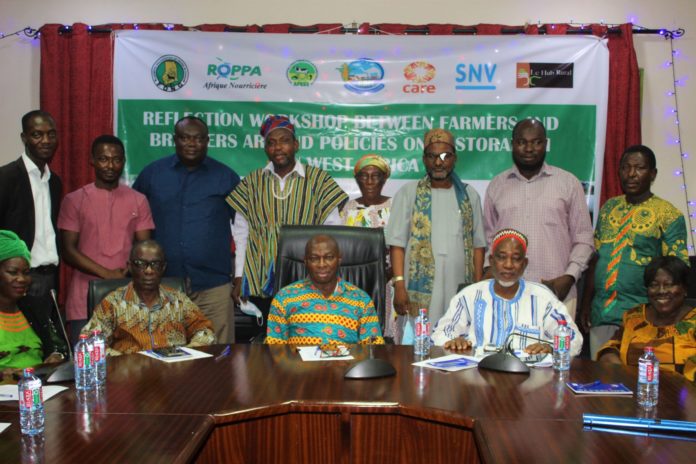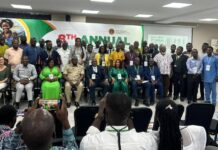Herder-Farmer conflict is a major issue in Ghana leading to loss of lives and properties. To manage and bring a lasting solution to the issue, stakeholders in the livestock sector have converged at Accra to discuss ongoing issues and policies on pastoralism in West Africa.
The workshop with the theme: Reflecting Workshop Between Farmers and Breeders Around Ongoing Policies On Pastoralism In West Africa converged farmers, breeders, and policymakers to deliberate on perturbed issues surrounding transhumance in Ghana and across West African block.
In a presentation at the workshop, Dr. Kwame Oppong-Anane, the Chairman of the Ghana Ranching Committee explained that transhumance is the movement of cattle from one area to another in search of foliage.
It is an old practice in which its movement is not random but highly strategic, drawn on the experience and local information with no demarcated corridors and grazing reserves available leading to herder-farmer conflicts in the country.
To ensure peaceful and beneficial transhumance in the country, Dr. Oppong-Anane said there should be awareness creation of transhumance practice.
Dr. mentioned that policies have been put in place both National and the West Africa block to ensure peaceful transhumance.
Explaining the government’s intervention to resolve herder-farmer disputes in the country, the Director of Animal Science Production at the Ministry of Food and Agriculture Mr. Edwin Bekoe said the government is determined to solve the transhumance issues by collaborating with international organizations and CSOs.
Moreover, some of the measures taken to resolve conflicts in Ghana include military intervention to reduce herder-farmer conflicts in conflict-prone areas. This was a disaster to both the cross-border and sedentary transhumance.
The formation of the Ghana Cattle Ranching Committee in 2017 by the government is to find a lasting solution to herder-farmer conflicts. The government has re-established two fodder banks into model cattle ranching in Wawase and Amankwa to stock livestock belonging to individual farmers.
Mr. Bekoe added that a proposal has been submitted to the government for the establishment of ten grazing reserves and corridor systems in the country covering over 500,000 hectares.
So far, two livestock markets have been constructed at Gushegu and Buipe in the Central Gonja, one loading bay in Pusiga, two securing grazing areas in Jankpihi, Karaga, Gberigi all in the central Gonja, three securing rest areas, five water points and 50km securing livestock corridors infrastructure developments have been constructed to provide favorable condition for transhumance in the country.
Speaking on behalf of the cattle farmers, the National Chairman for the Ghana National Association of Cattle Farmers (GNACAF), Imam Hanafi Sonde commended the Ghana Cattle Ranching Committee for the remarkable effort to resolve herder-farmer conflicts and constructing infrastructures to aid in the peaceful and smooth operation of transhumance.
He acknowledged the casualties emanate from the herder-farmer conflicts in communities like Asante Akim Agogo, Ejura and its surroundings in the Ashanti Region, Kwahu Afram Plains in the Eastern Region, and other parts of the country undermining the peace in the various communities as well as tarnishing the image of the cattle farmers.
“There should be a sustainable public awareness creation at the national, regional, district, and community levels on the benefits of Agro-Pastoralism in the society”, Imam Sonde recommended.
National and West African Policies on Transhumance.
National Livestock Policies
According to the presentation, two strategic livestock development policy instruments were put in place to improve the performance of the livestock sector in the last two decades; Livestock development Policy and Strategies (2004-20014) and Ghana Livestock Development Policy and Strategy (2015-2023).
The strategic plan is to ensure that herders are in possession of the ECOWAS International Transhumance Certificate and identity papers issued by the competent authorities in their countries of origin, insist on Health certificates or evidence of disease-free cattle as conditions for entry.
There would be a registration of herds at the entry points, entry to the country would be subjected to the periods prescribed for entering by migrating livestock, there would be no crossing of the border during the night, herders would ensure that transhumance livestock is under constant guard both while on the move and during grazing and herds would be expulsed from the jurisdiction in appropriate cases on grounds of public order, security or public health.
The decision by ECOWAS MEMBER STATES on Transhumance.
All transhumance livestock shall be allowed free passage across points of entry into and departure from each country on the condition that they have the ECOWAS International Transhumance Certificate.
The certificate aims to enable the authorities to monitor the herds before they leave the country of origin, protect the health of local herds, and make it possible to inform the host communities of the arrival of transhumance.
The certificate contains details on the composition of the herd, the vaccination is given, the itinerary of the herds, the border posts to be crossed, and the final destination, and it would be issued by the livestock department and initiated by the local administrative authorities in the country of origin.
The document shall be verified and counter-signed by competent authorities at the entry and exit points in the host country, transhumance herds shall follow the routs defined by the member states in accordance with the itinerary indicated on the ECOWAS International Transhumance Certificate, and there shall be no crossing of borders at night.








